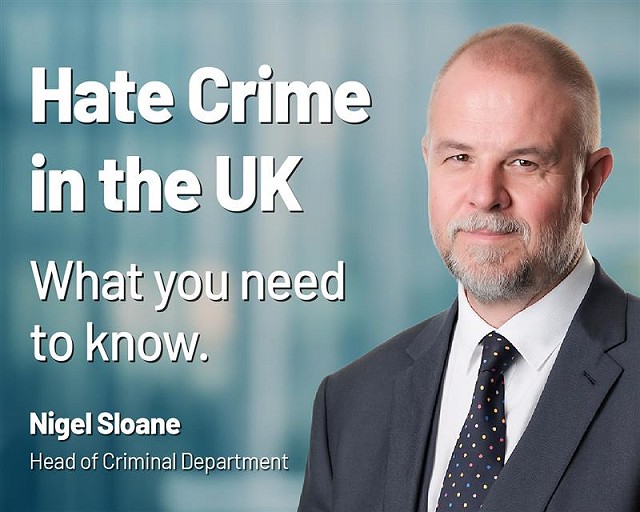- Home
- About
- Our People
- Business
-
Personal
- Wills and Trusts
- Conveyancing
- Divorce
- Child Contact
- Family Law
- Property Disputes (TOLATA)
- Criminal Law
- Civil Litigation
- Landlord and Tenant
- Inheritence Dispute
- Personal Injury
- Criminal Injury
- Road Traffic Law
- Adoption
- Consumer Rights
- Debt Recovery
- Injunctions
- Defamation
- Libel and Slander
- Care Proceedings
- Domestic Abuse
- Financial Remedy
- Join Us
- Pepptalk
- Pay Online
- Contact
Return to Pepptalk
Hate Crime in the UK: What you need to know
Hate crime is a serious offence in the UK, and the law takes it very seriously. For individuals accused of such offences, the consequences can be life-changing. At Pepperells Solicitors, we want to explain what the law says about hate crime, what actions can lead to an arrest, and how you should respond if you find yourself facing allegations.
What Is a Hate Crime?
In UK law, a hate crime is any criminal offence that is motivated by hostility or prejudice towards someone’s:
• Race or ethnicity
• Religion or belief
• Sexual orientation
• Disability
• Gender identity (transgender identity)
The hostility can be demonstrated through words, behaviour, or even the circumstances in which the offence occurs.
For Example:
• Using threatening or abusive language towards someone because of their race
• Assaulting someone while making derogatory remarks about their religion
• Damaging property belonging to someone because of their sexual orientation
The following are common allegations that fall under the umbrella of hate crime:
• Verbal abuse – using insulting or threatening language linked to race, religion, sexuality, disability, or gender identity
• Online hate speech – posting offensive comments or messages on social media
• Harassment – repeated behaviour intended to cause alarm, distress, or humiliation, motivated by prejudice
• Assault – physical attacks where hostility towards a protected characteristic is a factor
• Criminal damage – damaging property while expressing prejudice
• Stirring up hatred – encouraging others to hate or attack a group of people
Even a single remark, if deemed abusive and motivated by hostility, can lead to arrest and prosecution.
Penalties and Consequences
Courts treat hate crimes with particular seriousness. Sentences can be increased significantly compared to similar offences without a hate element. Possible consequences include:
• Fines
• Community orders
• Imprisonment
• A permanent criminal record
Convictions for hate crime can also have lasting effects on employment, reputation, and travel.
What To Do If You Are Accused
Being accused of a hate crime can feel overwhelming, and the law in this area is complex. You should:
• Seek legal advice immediately – do not answer questions without speaking to a solicitor
• Do not attempt to contact the complainant – this will make matters worse
• Keep records – if the incident took place online or in public, save any evidence that may assist your defence
How We Can Help?
If you are facing allegations of hate crime, it is vital to have expert legal representation. Our team of criminal defence experts have extensive experience in defending clients accused of racially or religiously aggravated offences, public order matters, and other hate-related allegations.
We Will:
• Provide the best legal defence for you
• Explain the law clearly and simply
• Represent you at the police station, representation is FREE of charge whether
you are under arrest or invited for a voluntary police interview
• Represent you in Court whether funded privately or by Legal Aid
• Challenge weak or unsubstantiated allegations
• Work to secure the best possible outcome in your case
Apply today to become part of #teampepps and take your career to the next level.
Please email your CV and covering letter to careers@pepperells.com.

Pepperells Limited, registered in England and Wales: No. 10244781 | Registered Office: 100 Alfred Gelder Street, Hull, East Yorkshire, HU1 2AE | Authorised & Regulated by The Solicitors Regulation Authority | Regulation Authority Numbers 636188, 638556, 638554, 647027, 668558, 807163, 818433, 832782, 830125, 8000373, 8007670, 8007671, 8009311, 8009312, 8013429, 8013430, 8013428 and 8013376 | www.sra.org.uk
Pepperells Solicitors are committed to ensuring that all Partners, Consultants and Employees give their full co-operation to the Legal Ombudsman in the event of any dispute or complaint against our firm, contact details of which can be found at www.legalombudsman.org.uk. VAT No. 365 0589 36

